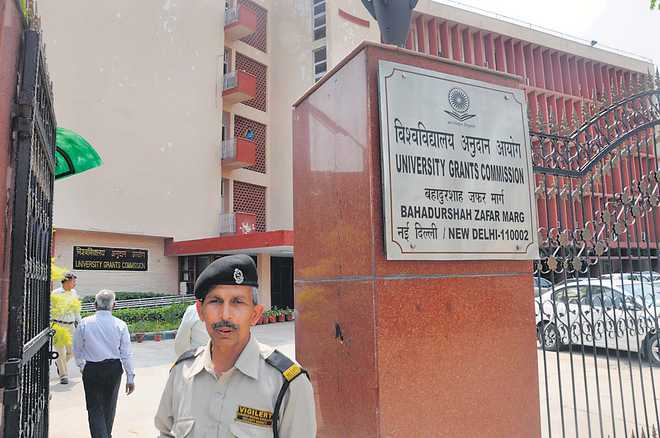
HIGHER EDUCATION: The HECI to replace the UGC. Tribune photo: Mukesh Aggarwal
Bhupinder Brar
Professor Emeritus, Panjab University, Chandigarh
FIRST came the Niti Aayog. That was in January 2015, just a few months after the Modi government had come to power. Now, in the last year of this government, comes the Higher Education Commission of India (HECI). The clue to understanding the latter, lies in the former. For only when they are taken together, the two tell a larger story.
First, some facts. The Higher Education Commission will not be a new institution built on fresh ground. Nor was Niti Aayog when it was set up. The moves dismantle and replace existing institutions of long standing. Niti Aayog had replaced the Planning Commission. The HECI will replace the University Grants Commission. The Planning Commission was set up in 1950 and the UGC in 1956.
Over the ensuing decades, neither the Planning Commission nor the UGC functioned to everybody's satisfaction. It was clear that they needed reform. But reform is one thing, replacement quite another. The first part of the larger story to grasp, then, is this: the two moves are only as much about creation as they are about dismantling.
What is it that they seek to dismantle?
The two were set up during the early years of the Nehru government. But this is not about Modi versus Nehru. It is about contending ideas of planning and development. Nehru's thinking might be summed up thus: development needed planning, planning needed experts, experts needed to be independent and autonomous, and above all, the experts needed to be part not only of planning but also implementation. For that, two things were required. One, the experts had to be chosen in a professional, and not a political, way. Two, the experts needed to have resources allocated to them over which they would have independent command. Nehru's vision committed the Indian state to do all that.
If the two institutions failed to meet the expectations, you could either blame the men and women who were given the responsibilities to run them, or you could find faults with some organisational details. Or, you could do something far more drastic. You could reject the entire philosophy behind the organisations. The dismantling we are discussing proceeds on the last.
What the two new institutions, one in place and the other proposed, have in common are two things: lack of autonomy and lack of independent resources. The PMO, the Finance Ministry, the HRD Ministry, and sundry other centres of power in the government will have a decisive say in who is appointed. These centres of power will also have full control of the resources to the complete exclusion of these institutions. The earlier institutions had autonomy and agency; the new institutions are penniless think-tanks of handpicked advisers.
Some argue, and many agree, that it was high time the country got rid of the old-fashioned and outdated Nehruvian philosophy of development and planning. That, it has no relevance in the age of liberalisation, privatisation and globalisation. One could agree with this for one brief moment for the sake of argument. The question that would immediately arise, then, is what philosophy is relevant for today, and whether these new institutions are best suited to the purpose.
It is here that one would have serious doubts. If we want to create globally competitive 'world class' universities, the route to doing that is not asking our universities to raise their own funds or starve to death. The route is not to ask them to look for loans rather than state grants. If you look at the world class universities, historically none of them in Europe, and more recently none of them in China or East Asia, were asked to beg, borrow or steal. They came up and became world class on solid and steady state funding for decades, if not centuries.
Secondly, the state funding flowed through autonomous bodies. That ensured that universities were assured of funding even while they nurtured unconventional and innovative ideas. It meant that they could also nurture dissent and protest against the establishment without being threatened.
Our UGC was built on that pattern. That is why it had some authority over the distribution of allocated funds. The HECI will not have that. The universities will now have to function in a way that meets with political-ideological approval of the government of the day.
The second problem with the HECI is its obsession with standardisation of academic criteria and practices.Of course, regulatory authorities are meant to ensure minimum standards. But over and above those minimum standards, there should be no standards and standardisation if you want to build world class universities. Excellence thrives on pursuing unique ideas and talents, not on following standard drills. That is why Indians win Nobel prizes only when they work abroad.
One last point of clarification: The present dispensation too has been talking of giving 'good' universities some degree of autonomy in matters of courses, syllabi, etc. There is a killing clause there, however. These universities will have to raise their own funds for the purpose. That means that the so-called autonomy will necessarily be market-driven. Clearly, courses that are not commerce- and profit-oriented will not attract students ready to pay high fees. And that means the university will never start them, or sustain them in the long run.
The purpose of doing planning for development is to distinguish between the common good and the market, and fund even what is 'loss-making' because it is socially needed.
These are some elementary truths. You can junk Nehru. You can junk the institutions he built. But you cannot junk these elementary truths.



























